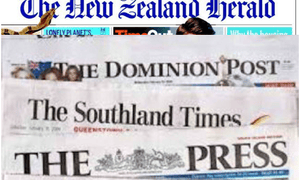
Ten years ago this month, I made a series of speeches in New Zealand warning of impending doom for journalism should the country’s newspapers go to the wall.
It struck me at the time that the situation there for newsprint and its publishers was __more dire than anywhere else in the English-speaking world.
I thought a small market, without any print penetration from elsewhere (as happens, for example, in Ireland), might suffer disproportionately from the digital revolution’s disruption.
Ever since, I have been charting the New Zealand’s industry’s gradual contraction. In 2012, the leading owner, the Australian-based APN, was reportedly seeking a buyer for its Kiwi assets.
It soldiered on, however, and months later it made the familiar switch of format from broadsheet to compact at the country’s leading title, the Herald, in the hope of retaining sales.
In 2014, it merged its newspaper division with radio and e-commerce businesses to create a unified and separately listed media company, New Zealand Media and Entertainment (NZME).
The rebranding, for that is what it was, inevitably fuelled speculation of a possible sale, with Australia’s Fairfax Media as the likely buyer.
Although it was denied at the time, the direction of travel was obvious. In May this year, it was revealed that Fairfax and NZME were in advanced merger talks.
This was denied preliminary approval by the country’s commerce (competition) commission because of concerns about a press duopoly becoming a monopoly, a point I also made.
However, a significant change at New Zealand media companies was soon revealed: they had become “exclusively owned by financial institutions.” (News Corp dispensed with its shares in NZME soon after it was founded).
Now, the majority of New Zealand’s editors are fighting a rearguard action to prevent the creation of a mainstream media monopoly.
One of them, former Herald editor-turned-academic, Gavin Ellis, told the Financial Times of his concerns about job cuts and the loss of diversity should the proposed NZME/Fairfax merger be given clearance.
The commission is sympathetic. Last month, its draft response to the companies’ application noted that it would result in a single business controlling 90% of the daily newspaper market, making it “the second highest concentration of print media ownership in the world, behind only China.”
But will the commission, in its final March report, deny the move towards monopoly? And, if it does, what then for the cash-strapped papers? Consolidation may be unpalatable for journalists (and for democracy) but it makes commercial sense in a fast-declining market.
Online competition from outside the country reduces the selling power of domestic papers. New Zealanders can read all the leading international news media outlets, such as the Guardian, BBC and New York Times.
They don’t cover internal news, and that should be the major plus for NZ papers. The problem, however, is that the continuing flight of advertising from print to the web means they are finding it increasingly difficult to fund their editorial staffs.
It is noticeable that, in their submission to the commission, the companies threaten to cut journalistic jobs if they are not allowed to merge. They say:
“In the absence of a merger, the likely counterfactual is that to maintain financial viability each of the parties would need to aggressively consider cuts to frontline news functions such as reporting.”
Editors don’t like that one bit, understandably. So what’s to be done? Ellis has picked up on two solutions this author has been advocating for some time.
First, consider not-for-profit ownership of newsapers. Second, raise a levy on the profiteering social media companies.
He told the FT: “The rapacious aggregators of news should pay a tax, with the proceeds flowing through to media companies that create the content they use to generate advertising revenues.”
But New Zealand is not the only anglophone country facing such peril. Australia, and particularly Canada, are soon likely to be in a similar crisis situation.
Before time runs out, talk about new models of ownership and the taxing of digital conglomerates needs to be replaced by action. Democracy demands it. And shouldn’t it be the UK that shows the way?